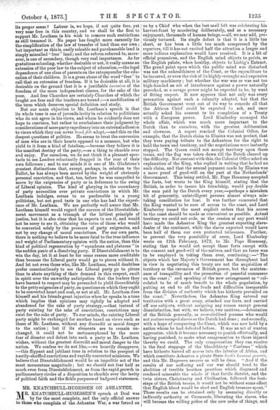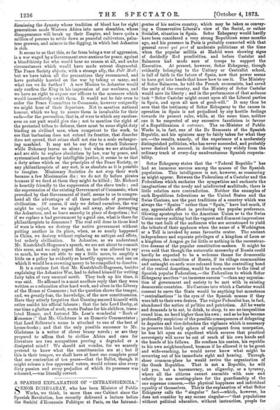MR. KNATCHBULL-HUGESSEN ON ASHANTEE.
A4R. KNATCHBULL-HUGESSEN'S speech at Deal was It/ by far the most complete, and the only official answer to those who complain of the Ashantee War, a war forced on
us by a Chief who when the last mail left was celebrating his harvest-feast by murdering deliberately, and as a necessary enjoyment, thousands of human beings,—all, we may add, pre- viously tortured. Its single defect is that it is a little too short, or has been a little too much compressed by the reporters, till it has not excited half the attention a longer and more tedious explanation would have received. It is a bit of official pemmican, and the English mind objects to precis, as the English palate, when healthy, objects to Liebig's Extract. The grand point upon which the public mind was disturbed was not the unhealthiness of the Coast, or the expenditure to be incurred, or even the risk of its highly-wrought and expensive military machinery ; but whether the war was or was not too high-handed an act of interference against a power naturally provoked, as a savage power might be expected to be, by want of fitting respect. It now appears that not only was every precaution against such a calamity adopted, but that the British Government went out of its way to concede all that the African Chief could be expected to ask, and once actually asked his consent to its completion of a Treaty with a European power. Lord Kimberley managed the whole affair, which was much more important to the Dutch than to ourselves, with the greatest deliberation and slowness. A report reached the Colonial Office, for example, that the Dutch claim to Elmina was not perfect, that. they were paying tribute to the Ashantees for the right to hold the town and territory, and the negotiations were instantly stopped. The Queen could not accept territory upon those terms, and the flag was taken down till the Dutch cleared up the difficulty. Not content with this, the Colonial Office asked an explanation of the King, who replied in writing that he had no- such claim, and that the annual payment made by Elmina was a mere proof of good-will on the part of the Netherlands' Government. This being settled, Mr. Pope Hennessy accepted the forts, but wrote to the King himself, stating that the British, in order to insure his friendship, would pay double the sum paid by the Dutch every year,—perhaps a mistaken bit of generosity, unintelligent persons almost always mis- taking conciliation for fear. It was further rumoured that the King wanted to be sure of access to the coast, and Lord Kimberley issued the most explicit orders that his access to the coast should be made as convenient as possible. Actual territory we could not cede, as the cession of any port would have made the Ashantee King the greatest exporting slave- dealer of the continent, while the slaves exported would have been half of them our own protected tribesmen. Further, to prevent the very possibility of error, Lord Kimberley- wrote on 12th February, 1872, to Mr. - Pope Hennessy, stating that he would not accept these forts except witk the consent and good-will of the natives, and that no force was to be employed in taking them over, continuing :—" The objects which her Majesty's Government has throughout had in view in negotiating this treaty are not the acquisition of territory or the extension of British power, but the mainten- ance of tranquillity and the promotion of peaceful commerce on the coast ;" and speaking of the new arrangement as "cal- culated to be of much benefit to the whole population, by putting an end to all the feuds and difficulties inseparable from the division of authority which has hitherto prevailed on the coast." Nevertheless, the Ashantee King entered our territories with a great army, attacked our forts, and carried off our subjects, without assigning any reason except general dissatisfaction, but with, we believe, two motives,—detestation of the British generally, as over-civilised persons who would not restore escaped slaves as the Dutch had done ; and secondly, with a hope of conquering the Coast, which was now held by a nation whom he had defeated before. It was an act of wanton aggression, which it became necessary to punish effectually, and having punished, to make what compensation to those injured thereby we could. The only compensation they can receive is the final stoppage of the bloodthirsty " Customs " which have hitherto barred all access into the interior of Africa, and which constitute Ashantee a pirate State hostis humani generis, and this Mr. Hugessen assures us will be done. "And if the results of our suffering and' our war should tend to the abolition of terrible heathen practices which disgraced and rendered miserable the whole of that fertile district, and the twin sisters, Christianity and Civilisation, followed the foot- steps of the British troops, it would not be without some effect that English blood would be shed and English treasure spent."' Those results can be obtained only by assuming directly or- indirectly authority at Coomassie, liberating the slaves, who will become the willing police of the new order of things, and dismissing the dynasty whose tradition of blood has for eight generations made Western Africa into mere shambles, whose disappearance will break up their Empire, and leave quite a million of persons to settle down as peaceful cultivators, palm- tree growers, and miners in the digging, in which last Ashantee is rich.
It seems to us that this, so far from being a war of aggression, is a war waged by a Government over-anxious for peace, against a bloodthirsty foe who would hear no reason at all, and under circumstances which would have made retreat disgraceful. The Peace Society objects, with a strange ally, the Pall Mall; but we have taken all the precautions they recommend, and have probably hurried on the war by taking so many, and what can we do farther? A new Mission to Ashantee would only confirm the King in his impression of our weakness, and we have no right to expose our officers to the massacre which would immediately await them. It would not be fair even to order the Peace Committee to Coomassie, however resignedly we might hear of their departure. Not to mention national honour, which we beg to assure them is invaluable for their ends—for the prevention, that is, of wars to which any careless- ness on our part would give rise ; not to mention the right of the protected tribes to defence, there must be some slight duty binding on civilised men, when competent to the work, to see that barbarism does not extend its frontier, that disorder does not spread, that crime shall not rise to a scale endanger- ing mankind. It may not be our duty to attack Dahomey while Dahomey leaves us alone ; but when we are attacked, • and are able to replace absolutism by law, war by peace, and systematised murder by intelligible justice, it seems to us that a duty arises which on the principles of the Peace Society, or any philanthropists of any sort, is as absolute as it is possible to imagine. Missionary Societies do not stop their work because a few Missionaries die ; we do not fly before pirates because if we fired at them they might be killed ; Mr. Richard is heartily friendly to the suppression of the slave trade ; and the supersession of the existing Government of Coomassie, when provoked by that Government of itself, seems to us to compre- hend all the advantages of all these methods of promoting civilisation. Of course, if only we defend ourselves, the war might be unjust, for we might sail away, after destroying the Ashantees, and so leave anarchy in place of despotism ; but if we replace a bad government by a good ohe, what is there for philanthropists to denounce ? The real evil done in these kind of wars is when we destroy the native government without putting another in its place, when, as so nearly happened in China, we destroy without replacing an antique and effete, but orderly civilisation. In Ashantee, as we understand Mr. Knatchbull-Hugessen's speech, we are not about to commit this error, and we only regret that, as he was allowed to say so much, he was not able to say a little more, to amplify a little on a policy he evidently so heartily approves, and one on which it would be a crowning mercy to be compelled to dissolve.
It is a curious fact that Mr. Knatchbull-Hugessen, besides explaining the Ashantee War, had to defend himself for writing fairy tales of very unusual merit. They took up his time, it was said. He affirmed in a most needless reply that they were written as a relaxation after hard work, and often in the Library of the House of Commons ; but the question shows the temper, and, we greatly fear, the knowledge, of the new constituencies. Have they utterly forgotten that Canning amused himself with satire amidst his official labours ; that the late Lord Derby, at one time a glutton of work, wrote Psalms for his children, trans- lated Homer, and fostered Mr. Lear's wonderful "Book of Nonsense ;" that Mr. Gladstone is an Homeric Commentator ; that Lord Selborne's name is attached to one of the best of hymn-books ; and that the only possible successor to Mr. Gladstone is a writer of clever brassy novels ; or are they prepared to affirm that to civilise Africa and care for literature are two occupations proving a degraded or a dissipated mind ? We should not wonder, for we scarcely pretend to know what the constituencies are at ; but if this is their temper, we shall have at least one complete proof that our contention of ten years—that the Ballot, though it might release a few oppressed voters, would release also every dirty passion and every prejudice of which its possessor was ashamed,—was literally correct.



































 Previous page
Previous page